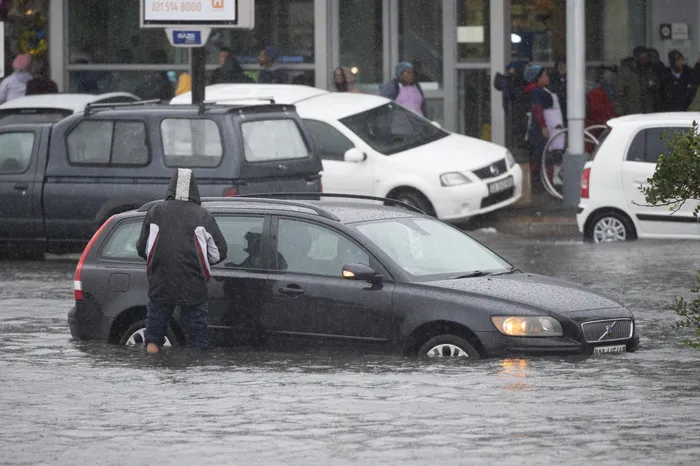Cape Town prepares for winter flooding: City assures residents of readiness

The City reassured residents about their winter readiness program.
Image: Armand Hough/Independent Newspapers
With another cold front to hit the western parts of South Africa, the City of Cape Town has assured residents that they are well prepared with their winter readiness plan.
However despite these assurances a series of flooding incidents across the metro in recent weeks has cast a dark cloud over the actual state of readiness.
Just a week ago, a Parkwood grandmother issued an emotional plea to the City of Cape Town to urgently clear blocked drains ahead of the winter rains.
This comes after her eight-year-old grandson Tyler Cupido narrowly escaped drowning in a flooded street earlier this month.
Francis Fick, 60, said she believes the incident — which unfolded in Moosa Walk — could have been prevented if the stormwater system had been cleared in time.
The drains, she explained, routinely overflow during winter, turning the roads into what she described as “a river”.
Good Party’s councillor Siyabulela Mamkeli, said the recent floods exposed systemic issues in the City’s infrastructure maintenance, particularly the stormwater drainage network.
“In many of these communities, residents face the reality of rain entering their homes due to poor roof conditions and water backing up from blocked drains.
“This is directly linked to the City’s failure to maintain its stormwater systems. Basic preventative measures, such as clearing stormwater drains, are not being carried out with the frequency or urgency required.”
However Disaster Risk Management spokesperson Charlotte Powell insisted they are ready but confirmed that localised flooding, particularly in low-lying areas may be a problem.
"This happens when sustained heavy rainfall overwhelms the stormwater system or when blockages caused by illegal dumping obstruct the water flow," Powell said. She noted that while water levels generally subside as rain diminishes, ongoing rainfall or poor drainage systems can exacerbate flooding.
The City has pointed to its Winter Readiness Task Team, which meets from February each year, and includes multiple departments tasked with proactive flood mitigation. This includes clearing stormwater channels, resettling high-risk communities, and implementing the Floodwise campaign to educate residents about preventing flooding. However, despite these efforts, the frequency and scale of flooding remain a major concern.
Mayco member for Human Settlements, Carl Pophaim, said flood kits and sandbags are being distributed to impacted households in informal settlements. Pumping equipment has also been deployed in areas where water is not draining due to poor soil conditions.
"Some areas are severely impacted and are waterlogged. The water does not drain away as in more habitable areas," Pophaim said.
Heavy rains have also led to infrastructure strain, with Energy mayco member Xanthea Limberg confirming that storm-related faults damaged electrical infrastructure across the metro. "During heavy downpours and high winds, teams must often wait for safer conditions before repairs can be carried out," she explained.
Water and Sanitation Mayco member Zahid Badroodien highlighted efforts by the Water and Sanitation Directorate with 59km of ageing water infrastructure replaced last year, surpassing the 50km target. For the upcoming financial year, R239 million has been allocated to continue this work. However, he stressed that "the City cannot simply overhaul all water infrastructure at once," due to the vast network involved and the need to maintain essential services.
Meanwhile, potholes have become another issue of concern. Mayco member for Urban Mobility, Rob Quintas, acknowledged that wet weather has caused major road damage. "We prioritise repairs based on road classification, but permanent repairs can only happen in dry conditions," he said. Temporary fixes are currently being used until the weather improves.
While multiple departments have detailed the work they are doing, residents remain sceptical. Many communities, especially those in informal settlements or flood-prone zones, say they are yet to feel the impact of the City’s supposed winter readiness. Even with targeted interventions like flood kits and outreach programmes, the reality on the ground paints a different picture.
Homeless residents are particularly vulnerable. Councillor Francine Higham said the City has increased its support to shelters and rolled out its five-tiered strategy to support individuals living on the street, including work placements and access to health services.
Melt Botes from the Department of Infrastructure said that while a preventative maintenance regime is in place for roads under provincial authority, the cost of full replacement is prohibitive. He added that rapid responses to damage, like the recent large pothole near Old Oak offramp on the N1, are part of the department’s operational calendar and not winter-specific funding.
Weekend Argus
Related Topics: